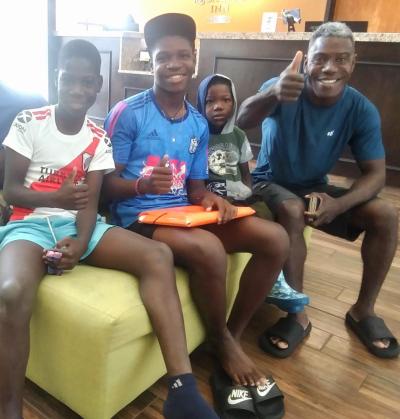After long journeys, migrants’ priorities include school, work
MIDDLEBORO - The number of migrants staying in Middleboro’s Quality Inn hotel has increased in the past week, from an original 24 to 147 as of Tuesday, Oct. 3.
Middleboro residents and organizations have been donating food, clothing, toys and other items to the migrants. According to Select Board Chair Mark Germain, the housing of the migrants will “in no way compromise the level of services provided to all other Middleborough residents.”
One migrant, Benice, said that he left Haiti in 2013. According to a list he and another migrant wrote down, after leaving Haiti he had passed through 12 countries: French Guiana, Brazil, Bolivia, Peru, Ecuador, Colombia, Panama, Costa Rica, Nicaragua, Honduras, Guatemala, and then Mexico before finally arriving in the United States.
Fourteen of the migrant children in the hotel will start school this week, according to a press release from the town. The school district “will be receiving funding and some supplies from the state.”
To prepare for the start of school, on Wednesday last week the town took some of the children on a “test” school bus ride. Five Star Bus Company donated the rides to the district, and according to the town, for many of the children “it was their first time riding on a school bus.”
Benice said he had three children whose ages range from five to sixteen.
Through google translate, he said that “it is important for my children to go to school” and that the last time they had gone to school “was in the month of may.” He later wrote in French that “I came to the United States to educate my children.”
Benice also said in French that the food at the hotel was “good” and “delicious.”
Another migrant and parent, Janne, said through Google translate that “I’m happy for the children to go back to school” and that the last time they had gone to school was in March 2023.
On Saturday, the Middleboro library organized a story hour for the migrant children, which included balloons and stories translated in both English and Haitian, according to a press release from the town and a text from Middleboro Health Agent Kayla Smith.
Through Google translate, one of the migrants, Loudy, wrote that he needed to leave Haiti because “Haiti is very difficult” and that “I can’t live there, I’m persecuted there.”
“I came to work,” Loudy wrote. He wrote that he had traveled through Brazil, Bolivia, Peru, Ecuador, Colombia, Panama, Costa Rica, Nicaragua, Hondouras, Guatemala, and Mexico before arriving in the United States.
Another migrant, Philistin, wrote through Google Translate that he wanted “to be able to work to help my family.” Philistin wrote that he had traveled through multiple countries to get to the US and that he had left Haiti in 2016.
To keep the migrants clothed and sheltered, Middleboro residents and nearby organizations have been donating supplies, and the donations are coordinated by town officials.
Diane Fay, the Secretary of the Friends of the Middleboro Library, was one of the Middleboro residents who brought toys for the migrant families.
The migrants “came with what they had,” Fay explained. “Just the clothes they had on.”
Smith said that she is working to help coordinate donations from different groups. She said that schools had donated food items, and that Middleboro’s Society of St. Vincent de Paul had also donated items.
“The [friends of the library] brought over toys earlier, and the smiles on the kids’ faces was adorable,” Smith said. “The toys are a huge hit right now. And then the parents really appreciate the food items.”
According to a Middleboro press release, anyone wishing to donate should contact Family Resource Coordinator Meghan Quirke at mquirke@middleboro.k12.ma.us.
The press release also said that the Massachusetts Department of Public Health has “been intaking families at the hotel and conducting a needs assessment for each family,” and that “the state has hired a certified contractor to provide required immunizations to children who need them.”
Middleboro Police Chief Joesph Perkins said that communication with the migrant families has been a barrier, as the migrants don’t speak English. However, one town employee, Police Officer Gustavo Ribeiro, happened to speak multiple languages including Haitian Creole.
Perkins said that he had asked Ribeiro to help with translation.
“Officer Ribeiro speaks four languages: Haitian-Creole, Portuguese, Spanish and English,” Perkins said. “He has been well received by the group and has been doing a great job helping to translate and communicate.”
Fay said that she has helped other people throughout her life, including at her first job working at a hospital.
“It’s not new to us,” she said. “This is what we do.”
















